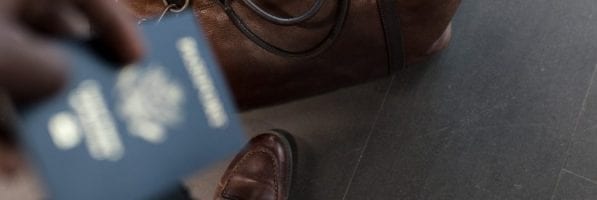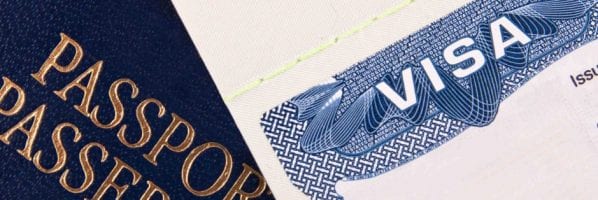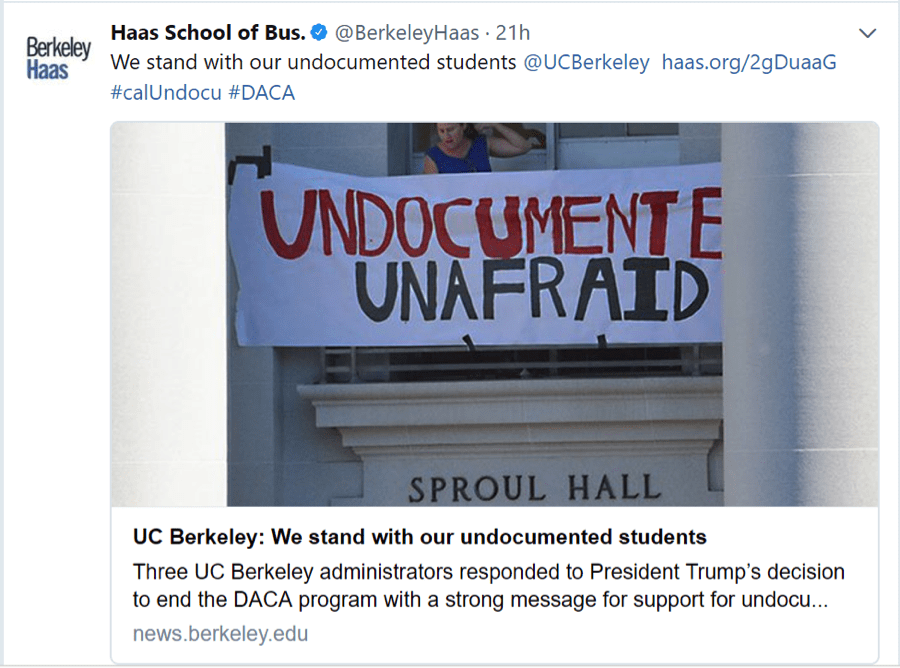New GMAC Report Gives New Warnings for Global Talent Search

A rapidly changing global economy and prohibitive immigration laws are making the search for international talent difficult for U.S. business schools.
Continue reading…H-1B Visa Challenges and Post-MBA Industry Employment Outlook

Immigration is in a precarious place in the United States. While media tend to focus on asylum and family separation, the Trump administration has taken aim at the H-1B Visa program. As Clear Admit previously outlined, the H-1B is necessary for any foreign-born individuals who want to work in the United States. Part of the Trump administration’s “America First” policy, the increased attention given to this visa program has created multiple issues for international students and the businesses that hire them.
The first issue that most international MBAs who want to work in the United States will face is the lack of companies who are interested in hiring them. According to the 2018 GMAC Corporate Recruiters Survey, only 47 percent—down from 55 percent in 2017—of all companies surveyed in the United States intended to hiring international candidates. Students interested in working in finance, health care, manufacturing, and nonprofit sectors may want to change their plans as these are the sectors least likely to hire internationals. Only 11 percent of health care firms surveyed said they plan to hire international candidates in 2018, while 14 percent were willing, but had no plans. Seventy-five percent—the highest among the reporting industries—said they would not hire international personnel. Seventy-two percent of non-profit/government agencies and 60 percent of manufacturing companies also responded that they would not be hiring international candidates. The best sectors for international graduates are consulting and technology. Thirty-seven and 39 percent, relatively, reported that they plan to hire international candidates. Over a quarter of companies in both industries reported that they would be willing to hire internationally, but did not have concrete plans to do so.

The reason that it is so hard for international MBA graduates is the nature of the H-1B visa process. If an employer chooses an international graduate and is willing to sponsor their application, neither the firm nor the employee can be sure that the employee will be chosen for the visa lottery.
A current international first-year student at Dartmouth’s Tuck School of Business tells Clear Admit that they haven’t second-guessed their decision to attend a U.S. school:
“I do think about visas, but I am not worried. I look at my MBA from a top school as a long-term investment. I am confident it will deliver returns in many ways throughout my future. My advice to other international students is 1) know why you want the MBA and how precisely you want to utilize it before arriving to school and 2) complete the company research and practice to be extra prepared for recruiting.”
The number of international job-seekers in the United States has declined over the last two years from its peak of 236,000 in 2016. However, the number of applicants for H-1B visas remains high—190,000 people applied for 85,000 H1-B visas in 2018, filling the slots in five days, according to a U.S. Citizenship and Immigrant Services (USCIS) survey.
In addition to the small number of slots, applicants have to deal with the fact that USCIS has increased discretion over how visas are distributed. Although they are generally three years in length, H-1B visas under Trump’s USCIS have been of increasingly bizarre lengths. As noted in the lawsuit, ITServe Alliance v. USCIS, USCIS has issued visas that last one day and 12 days. One specific visa was expired for three weeks before it was received by the recipient. This has led to increased uncertainty around international MBA students getting the cover that they need to work in the United States.
If an international MBA student has received their three-year H-1B visa and has their desired position, he or she might run into difficulty being with their loved ones in the United States. H-1B holders can bring their partners over to stay with them on an H-4 visa while they wait for permanent residency; however, the Trump administration has spoken openly about eliminating this program. While legislation has been proffered to ensure that this program stays in place, the legislation’s chances of becoming law are slim to nil.
Although the current situation is grim, there are efforts being made to improve the situation. Tech firms, a primary beneficiary of the H-1B visa program, have been lobbying Congress to increase the 85,000-person cap for the visas. In addition, there is support among both parties in Congress to ensure that the H-4 program stays in place.
However, this might be too little, too late. These various difficulties have caused a decline in the number of international applicants at U.S.-based MBA programs. According to the GMAC 2018 Application Trends Survey Report, in the two years of the Trump administration, the number of international applicants to full-time MBA programs has decreased 13 percent.
With the system as it is oriented now, being an international MBA student will remain challenging. Tuck’s Emma He T’17 suggests that fellow (and hopeful) international students “target companies early, be willing to expand your search areas, and/or leverage your background for potential visa exceptions” in order to “mitigate visa concerns.”
Relief might come in the future, but it appears that putting America first will hurt U.S. MBA programs.
This article has been edited and republished with permissions from its original source, Clear Admit.
How Woman Can Close the Pay Raise Negotiation Gap, and More – Chicago News

Let’s explore some of the most interesting stories that have emerged from Chicago business schools this week.
Are You Willing to Stretch the Truth While Negotiating? – Kellogg Insight
Research trends have found that men are more willing to lower personal ethical standards during negotiations than women when it comes to pay raise negotiation.
However, a new study from Northwestern University Kellogg School of Management‘s Maryam Kouchaki, Assistant Professor of Management and Organizations, finds that there’s a situation that throws a wrench in the works: “when women negotiate on behalf of others.”
Kouchaki and her UC Berkeley co-author Laura Kray write:
“A woman who is negotiating on behalf of someone else will lie at roughly the same rate as her male counterpart. But, if she is negotiating on her own behalf, she is much less likely to deceive. Women in advocacy roles [get] as much done as men.”
You can read more about Kouchaki’s pay raise negotiation research here.
Will EU Migrants Pay Their Fair Share of Taxes? – Chicago Booth News
The Chicago Booth Initiative on Global Markets surveyed its European Economic Experts Panel, which is comprised of “50 economists and top researchers,” about whether recent European migrants are likely to “contribute more in taxes paid than they receive in benefits and public services.”
LSE’s Daniel Sturm writes, “Being younger and typically better educated, their [the migrants’] fiscal contribution tends to be positive as suggested by recent research for the U.K.”
Goethe University Frankfurt’s Jan Pieter Krahnen agrees:
“As [the] employment rate among migrants goes up over time, and much of taxation is indirect anyway, chances are that the statement comes true.”
Director of the European IGM Panel Christian Leuz is less optimistic. “[It is] too early to tell. Labor market outcomes are often worse for [a] long time. Demographics are [a] plus. Much depends on fast integration into [the] labor market.”
You can read more from the panel’s discussion here.
Faculty and Students Team Up with Northern Illinois Food Bank – Quinlan School of Business News
Loyola University Quinlan School of Business’ Urban Social Benefit Incubator teamed up with the Northern Illinois Food Bank to develop a “new system for serving its families” to replace the precarious first-come, first-served process it currently employs.
Quinlan is proposing “an online ordering system that allows for pick-up at strategic locations in the community, such as a grocery store.”
Harry Haney, Associate Director of Quinlan’s Supply and Value Chain Center, who is helping spearhead the initiative, writes:
“It’s important to us to serve nonprofits and social enterprises to help make a difference in the community. Plus, our students are learning the real-world side of business and gaining additional educational exposure.”
You can read more about Loyola’s food bank initiative here.
Business, University Leaders Speak Out Against DACA Repeal

When the Trump administration formally announced yesterday that it would end the Deferred Action for Childhood Arrivals program (DACA)—putting a six-month expiration date on legal protections granted to approximately 800,000 people who entered the U.S. illegally as children—universities and business leaders were quick to condemn it. Indeed, vocal defense of the “Dreamers,” as those in the DACA program are called, resounded from Silicon Valley to the Ivy League.
“Dreamers contribute to our companies and our communities just as much as you and I,” tweeted Tim Cook, CEO of Apple and an MBA graduate of Emory’s Goizueta Business School. “Apple will fight for them to be treated as equals.” In an earlier statement Cook noted that Apple employs hundreds of people covered by DACA.
Facebook CEO Mark Zuckerberg released his own statement on his personal Facebook page. “This is a sad day for our country,” he wrote. “The decision to end DACA is not just wrong. It is particularly cruel to offer young people the American Dream, encourage them to come out of the shadows and trust our government, and then punish them for it.” He added that the young people covered by DACA contribute to their communities and to the economy. “I’ve gotten to know some Dreamers over the past few years, and I’ve always been impressed by their strength and sense of purpose. They don’t deserve to live in fear.”
DACA was enacted in 2012 under former President Barack Obama by executive order, allowing individuals who were brought to the United States as children or teens before mid-2007 to apply for protection from deportation and work permits. To apply, they had to be younger than 31 at the time the program was created, have come to the U.S. before turning 16, and have lived in the U.S. for at least five years. The U.S. Citizenship and Immigration Services reports that roughly 788,000 have had their requests for DACA status accepted.
University and Business School Leaders Denounce DACA Repeal
A Center for American Progress survey of roughly 3,000 DACA recipients found that approximately 72 percent of respondents were in higher education, 13 percent of those pursuing master’s degrees. And leaders in higher education—including at several leading business schools—were every bit as vocal as major business leaders in calling out the Trump administration’s decision and pledging their support to Dreamers.
Geoffrey Garrett, dean of the University of Pennsylvania’s Wharton School, called the repeal of DACA “bad for the economy and bad for society” in a tweet that also expressed his support for an official statement issued earlier in the day by University of Pennsylvania President Amy Gutman.

Maryellen Reilly, Wharton Deputy Vice Dean for Admissions, financial aid and career management, quoted from Gutman’s statement in her own tweet: “At Penn, we are committed to providing a safe and welcoming environment for all of our students and we will do everything we can…”

Columbia University, home to Columbia Business School (CBS), issued its own statement in opposition to the repeal of DACA. “Columbia unequivocally opposes the ending of DACA and is working with others in higher education to urge Congress and federal officials to reinstate DACA’s protections and protect the rights of those with DACA status during and after the ‘wind-down’ process that has been announced,” it read. It went on to add that in keeping with Provost John Henry Coatsworth’s November pledge, “our policies and plans aim to ensure that students who had DACA coverage are able to proceed unimpeded with their studies and that all students in the community feel safe and understand beyond question that Columbia’s dedication to inclusion and diversity, including of undocumented students, is and will remain unwavering.” CBS quickly retweeted its parent university’s stance and linked to the full statement.
And the Haas School of Business at the University of California at Berkeley tweeted: “We stand with our undocumented students.” That tweet linked to a statement issued by three ranking university administrators—Chancellor Carol Christ, Vice Chancellor for Equity & Inclusion Oscar, and Undocumented Student Program Director Meng So—that called on the Berkeley community to stand with undocumented scholars at the university and beyond.

“At a time when our campus and community values are being challenged by the prevailing national rhetoric and policy making, we must deepen our resolve and commitment to our principles and to each other,” read the Berkeley administrators’ statement. “During these difficult moments, we must defend strongly held values of dignity, diversity and community.”
The Kelley School of Business at Indiana University at Bloomington, for its part, retweeted its parent university’s official statement and pledge to support all its students.

In the statement, IU President Michael A. McRobbie called out the decision to end DACA “especially in light of the administration’s prior statements expressing support for young people protected by DACA and the strong bipartisan support that exists nationwide for maintaining the program.”
McRobbie went on to underscore the university’s support of all its students. “We believe that all of our students, regardless of their background or country of origin, bring to our campuses unique perspectives and experiences that enrich our living and learning communities,” he wrote. “In doing so, they reflect who we are—and what we strive to be—as a university that provides all students with the opportunity to expand their knowledge and succeed in a place where they feel valued, respected and at home.”
In fact, IU features an entire website—DACA @ IU—dedicated to helping DACA students at the university. On the website, the university states that though bound by state and federal laws, it will take steps to support all IU students regardless of documentation and will only inquire into a person’s immigration status when required by law. IU also provides counseling and support to students who have immigration-related concerns, including connecting students with available resources for educational and living expenses.
Penn, Columbia, Berkeley, and IU are just a few of countless schools that spoke out against the Trump administration’s decision. Prior to the final decision to end DACA, 600 college and university presidents signed a statement promoting DACA back in November. Even more recently, Duke University’s President Vincent E. Price wrote a letter in support of the program, and University of Michigan President Mark Schlissel made a statement as part of the university’s September 1st convocation saying, “I would like to reiterate to all of our students, from our own state, elsewhere around the country, and from all around the world, that you are welcome here … You make us a stronger university and enrich our community and nation by your many talents, hard work, and the diverse perspectives and life experiences you bring to campus.”
As information continues to be provided by the Trump administration, many universities and schools are preparing to provide up-to-date information for their DACA students and all who are affected. Check in with your school for more information.
This article has been edited and republished with permissions from Clear Admit.
Rutgers Professor Unpacks Conflicting Globalization Views

Rutgers Business School recently explored the views of Management and Global Business Professor Farok J. Contractor, who unpacks the complex domestic and international impacts of globalization.
Anxiety Persists for MBAs Despite Court Rebuke of Immigration Ban

Last week, a three-member panel of judges from the U.S. Court of Appeals for the Ninth Circuit refused the Trump administration’s call to reinstate a ban barring the entry of all refugees and visitors from seven predominantly Muslim countries into the United States. Although the case could still advance to the Supreme Court, yesterday’s ruling means that, for now, the executive order signed by President Donald Trump two weeks ago remains unenforceable.
That’s good news for international students from the affected countries, some of whom were detained at airports attempting to return to campus from overseas travel, others of whom were forced to cancel plans to leave the United States for fear they might not be allowed back in.
States Cite Harm to Higher Education as Major Reason for Opposing Ban
In affirming that the states of Washington and Minnesota had legal standing to bring the case against the immigration ban, the appellate judges specifically cited the ban’s injurious impact on the states’ public universities.
An excerpt from the ruling:
“Specifically, the States allege that the teaching and research missions of their universities are harmed by the Executive Order’s effect on their faculty and students who are nationals of the seven affected countries. These students and faculty cannot travel for research, academic collaboration, or for personal reasons, and their families abroad cannot visit. Some have been stranded outside the country, unable to return to the universities at all. The schools cannot consider attractive student candidates and cannot hire faculty from the seven affected countries, which they have done in the past.”
Citing the new court precedent, the judges argued that schools can assert the rights of their students. “The interests of the states’ universities here are aligned with the students. The students’ educational success is ‘inextricably bound up’ in the universities’ capacity to teach them,” the ruling says. “And the universities’ reputations depend on the success of their professors’ research.”
Of course, these concerns were not limited to public universities in the states of Washington and Minnesota. Indeed, as reported here, business schools around the nation were quick to decry the executive order on precisely those grounds. In the days immediately following Trump’s January 27 executive order, deans from Harvard Business School, UC Berkeley’s Haas School of Business, the University of Michigan’s Ross School of Business, the University of Pennsylvania’s Wharton School, NYU Stern School of Business and Columbia Business School, among others, spoke out strongly in opposition to the immigration ban while pledging to support their own affected students.
Global Business Education Is Best Antidote to Economic Nationalism, Say Business School Deans
Earlier this week, the Global Network for Advanced Management, a group of 29 international business schools committed to advancing innovation through global exchange, issued a statement in opposition to the current rise of populism, economic nationalism and anti-globalization rhetoric, noting that the global economy is more interconnected than ever before, making global exchange and engagement more important than ever.
Excerpt from the Global Network letter:
“As deans of Global Network member schools, we recognize that the fundamental drivers of global business are not changing. Technology will continue to advance and disrupt markets and societies, and the transfer of innovations and expertise across borders will continue. We believe that countries that retrench will harm themselves and their citizens. Therefore, we redouble our commitment to collaborative learning across countries and cultures, and to gain and leverage the insights of the best and brightest throughout the world. In this way, we continue to improve educational outcomes and professional development of our students, deliver innovations that benefit business and society, and contribute to a better world.”
This letter carried the signatures of deans from Haas, HEC Paris, INSEAD, Oxford’s Saïd Business School and Yale School of Management, among many others.
In the wake of the executive order, Haas Dean Richard Lyons received a letter signed by more than 1,000 Haas MBA students requesting that he reach out to deans of other business schools to speak out jointly against the executive order. He responded early last week to the Haas community that he had done just that.
Heightened Anxiety Persists
Despite yesterday’s ruling, business schools have encouraged their international students to exercise caution with regard to planned travel outside of the United States. “The temporary restraining order, which halted the enforcement of certain provisions of President Trump’s executive order banning foreign nationals from seven countries from entering the U.S., remains in effect after a decision by the 9th Circuit Court of Appeals,” read a notice posted today on the Harvard International Office (HIO) website. “Despite this ruling, the HIO continues to advise foreign nationals from the seven restricted countries (Iran, Iraq, Libya, Somalia, Sudan, Syria and Yemen) to exercise caution and discuss any travel plans with their HIO Advisor when considering travel outside the United States.”
This is because future court rulings could reinstate the ban, in which case foreign nationals from those countries most likely would not be admitted or readmitted to the country.
Next Year’s International Enrollment at U.S. Business Schools in Question
It remains to be seen what type of impact this uncertainty may have on international enrollment at U.S. business school’s next year. As of this writing, most business schools we reached reported that, thus far, international application volume had not been impacted.
“International application volume in Round 2 was identical to last year,” says Haas Assistant Dean of the full-time MBA Program and Admissions Peter Johnson. “Since our Round 2 deadline was in early January, it was after the election and before the recent executive order. If there is any direct impact from these events, it will likely be seen in the enrollment patterns of admitted international students, in our program and in other MBA programs across the country.”
Concern about the current administration’s policies and their impact on international students has been widespread. “The uncertainty and anxiety surrounding changes in visa and immigration regulations is affecting all international students, not only those from the countries included in the recent executive order,” says Johnson. “We have had questions ranging from ‘Will this impact my chances of admission?’ to ‘Will I be able to do an internship in the U.S.?’”
Johnson confirmed that Haas has no plans to alter its admissions process and will continue to offer spaces in its class to top candidates regardless of their country of origin. “We are committed to maintaining a diverse and inclusive environment, and international students and faculty are an important part of our community and the educational experience of all students,” he pledged.
HBS Managing Director of Admissions and Financial Aid Chad Losee made a similar pledge in a post to his Director’s Blog earlier this week. In it, he reaffirmed the school’s commitment to assembling a diverse class of leaders who will make a difference in the world, wherever they come from. “The recent U.S. executive order restricting travel to America for citizens from certain countries does not change this, nor are we changing our admissions policy or practices as a result,” he wrote.
This article has been edited and republished with permissions from Clear Admit.
